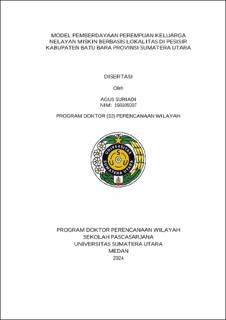Model Pemberdayaan Perempuan Keluarga Nelayan Miskin Berbasis Lokalitas di Pesisir Kabupaten Batu Bara Provinsi Sumatera Utara
A Locality-Based Empowerment Model for Women from Poor Fishing Families in The Coastal Areas of Batu Bara Regency, North Sumatra Province

Date
2024Author
Suriadi, Agus
Advisor(s)
Hasyim, Sirojuzilam
Badaruddin
Rujiman
Metadata
Show full item recordAbstract
The poverty of coastal communities, especially fishermen, is mostly caused by socio-economic factors related to resource characteristics and the technology used. These factors keep fishermen in poverty. For coastal communities, especially those who have a livelihood as fishermen (fishermen labourers, small-scale fishermen or traditional fishermen), policies and programmes to empower the fishing community should be designed based on women. The reason is because women take more roles in socio-economic activities on land, while men spend most of their time at sea fishing. Based on this reality, this research focuses on the empowerment of women from poor fishing families in an effort to improve their socio-economic welfare so that poor fishing communities can get out of the shackles of poverty. In this research, the approach used is a combination model (mix method) from Creswell (1994), namely the dominant-less dominant design approach, where the qualitative approach is used as dominant (qualitative-dominant), while the quantitative approach is used as less dominant (quantitative-less dominant). The qualitative approach is used as dominant, with the consideration that this research directs its attention to empirical inquiry, where the phenomenon of empowerment is in the context of the real life of poor fisher family women along the coast of Batu Bara Regency. Meanwhile, the quantitative approach is used to obtain data that can provide information about the spatial dimensions related to poverty and empowerment issues related to the accessibility and affordability of poor fisherwomen's family areas. Models of Women-Based Socio-Economic Empowerment that have been implemented in Batu Bara Regency have been carried out since 2017-2020, but there are still poverty issues that need to be addressed, including: lack of understanding of gender mainstreaming, limited gender awareness efforts, and gaps in gender perspectives in programme formulation and budgeting. The research shows that a more applicable model of empowering women from poor fishing families is through skills learning and becoming a learning resource for individual and community women. Through skills learning, the diffusion process of technological innovation involving women's communities has an important role in preparing individuals and communities for adaptation and social change. Data and research findings using the analysis of the Village Development Index (IDM) through three dimensions of assessment, namely the Social Resilience Index, Economic Resilience Index and Environmental Resilience Index, show that the villages representing the six sub-districts included in the coastal area are developed and developing villages, this means that the level of accessibility and the distribution of infrastructure is actually not an issue. Community access is wide open and does not become an obstacle or limit the lives of the poor to reach existing government resources.
